The 44th Annual Conference of The Philosophy of Education Society of Australasia (PESA) took place at the Conference Centre, Kingsgate Hotel, Te Rapa, Hamilton, New Zealand from Saturday November 22 - Tuesday November 25 2014.
Skip to Call for PapersSkip to Keynotes Skip to Publication Options Skip to Venue Info
The conference theme was
Education as Philosophies of Engagement
Ko te korero
To highlight the conference theme, this simple phrase is chosen to evoke the well-known Maori proverb, "Ko te kai a te rangatira, he korero" meaning literally "Talk is the food of chiefs" and metaphorically, "Discourse nourishes the essence of our humanity."
The term ‘engagement’ suggests many aspects crucial not only to education, but to living in our contemporary globalised world. Engagement invokes thoughts about the relational, the personal; to cultures, religions; physical, emotional, psychological and virtual spaces; contesting political, economic and social critique and encompassing notions of civic engagement and activism; of engaging the stranger and the foreigner, the self, the ‘thou’ and ‘other’. Engagement signals the importance of traversing philosophical possibilities and negotiating ways to deal with contrasting or conflicting views - with anger, with violence and war. How can we/ought we engage with each other and with world issues such as inequalities, child poverty, female education, genocide, democracy and so on based on these provocations?
The Procedings will be linked here when available.
Call for Papers
If you have not yet been contacted regarding the acceptance or not of your abstract, please let us know via
Once your abstract has been accepted, please register for the conference. Early Bird rates close on 31 August.
If you are submitting a Refereed Paper, please send to
A draft program will be available online as soon as we can manage. Keep checking the website for updates.
 2011 Wisconsin Budget Protests. Source http://en.wikipedia.org/wiki/2011_Wisconsin_protests
2011 Wisconsin Budget Protests. Source http://en.wikipedia.org/wiki/2011_Wisconsin_protestsThe PESA conference prides itself on providing a supportive, encouraging and welcoming environment for the presentation and robust discussion of scholarly work in philosophy of education. Presenters come from many different parts of the world and draw on a wide range of philosophical traditions and perspectives. Postgraduate students and others new to educational philosophy and theory are warmly encouraged to participate.
The theme of the conference is:
Education as Philosophies of Engagement
The term ‘engagement’ has a certain ring to it that immediately identifies with Sartre’s political philosophy understood as accepting the consequences for one’s actions that also extended to the notion of socially responsible writing (littérature engagée). This notion emerged from Marxian, Gramscian, and existential political philosophies that grappled with questions of change and interpretation, experimented with forms of democratic social action and cultivated awareness, authenticity and responsibility as the basis for the education and empowerment of minorities. Increasingly, in the post-war period Western philosophy stretched its boundaries to accommodate the demands of cultural and gender struggles for self-determination against the backdrop of colonisation, patriarchy and North/South inequalities. These philosophies of engagement that were embraced by the likes of Sartre, Beauvoir, Fanon, Freire and many others were grafted and hybridised with forms of democratic participation, grass-roots movement, forms of localism and representation, community empowerment and came to define the notions of civic education and public protest. Various forms of activism drawing on Ghandi and Martin Luther King began to engender the civil disobedience and community-building campaigns that characterised the Black civil rights, peace or anti-war, free speech, women and gay movements that dominated the politics of the 1960s and coloured its counterculture. Active citizenship participation has many philosophical sources and takes many different shapes in the hands of philosophers as diverse as Dewey, Peirce, Gramsci, Freire, Foucault, Derrida, Hall, Sen, Kristeva, Nussbaum, Benhabib, Fraser, Harding and Butler.
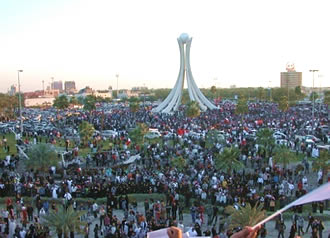 Protesters gathering in Pearl Roundabout in Manama. Source http://en.wikipedia.org/wiki/Arab_Spring
Protesters gathering in Pearl Roundabout in Manama. Source http://en.wikipedia.org/wiki/Arab_SpringOne prevalent and powerful educational model of engagement was “consciousness raising” (including “teach-ins”) popularised by US feminists and adopted thereafter by many political movements, volunteer and community service groups. The free speech movement originating at Berkeley in 1964 based on the demand for the right to political discussion became an important force in the anti-Vietnam campaign. A series of global problems and developments summons the need for a new level of engagement and global responsibility: global warming, child poverty, indigenous rights, the global sex trade, new levels of illicit corporate fraud especially in banking, government corruption, government tyranny, terrorism and the spread of diseases all call out for a critical and practical philosophy that might be called “global philosophies of engagement”. Recent global movements including Occupy, the so-called Arab Spring and demonstrations in Kiev demonstrate social media as convivial and coordinating tools for civic engagement. This conference examines philosophies of engagement in the global context and the potential of social media for new forms of citizen participation.
Possible ideas to pursue
- Pedagogies of engagement
- Engagement as dialogue
- Cultural engagement of the Other
- Cosmopolitanism and global civic engagement
- Human rights education
- Deliberative & participatory democracy
- Global political movements & social network activism
- Freedom of speech and the Internet
- Defending the commons
The aim of this conference is to create a space for dialogue on multiple aspects of philosophy of engagement and how this influences the various discourses of education. Contributors may like to consider engagement as civic responsibility, at a relational level or at the intersections between. This theme also provides avenues for contributors to 'engage' diverse philosophies in new and exciting conversations about education in a changing
Submission deadlines and details
Submissions that are accepted will be presented in 30 minute sessions, that include 10 mins for discussion. If possible we will try to organise 45 minute parallel sessions, but that can not be guaranteed at this stage.
Types of submission:
Submissions may be in the form of a presentation, refereed paper, or a symposium. See the Publications Options section.
Please send a title, type of proposed submission, contributor names and abstract (200 words max) to:
All abstracts will be reviewed by the Conference Committee. The Committee will allocate abstracts to the program taking into account the quality of each abstract, the balance of the program and the relevance of the paper relating to the conference theme.
Submission Formats
- Presentation (of work in progress, non-refeered) - requires an abstract and oral presentation of 25-30 minutes including questions. A presentation will be a work in progress and may use Powerpoint. If you wish to have a summary (2000 word max & a link to a PowerPoint) in the Conference Proceedings, it must be sent by October 24.
- Refereed Paper - requires an abstract and oral presentation of 25-30 minutes including questions. It will appear in the Conference Proceedings and you may choose different publications options. You may choose to revise your paper after the conference for publication in the PESA Conference 2014 Papers (with ISBN number). This is due by January 31 2015.
- Symposium – a set of 3-4 papers or a panel discussion on a specific topic. Each paper requires an abstract and oral presentation of 25-30 minutes including questions). A symposium provides an opportunity to examine specific issues or topics from a variety of perspectives, maybe presenting alternative solutions, interpretations, or contrasting points of view on the topic. A symposium may use a panel discussion format on a specific topic. It may be an interactive session where a large portion of time is devoted to discussion among the presenters and discussants, and/ or questions and discussion among all those present.
ABSTRACTS DUE: by 7th July, 2014 (we would appreciate earlier submissions please)
Abstracts for all submissions must be formatted and submitted according to the abstract template that can be found below.
To download the abstract template please click here (140kb)
To submit your abstract, please use this email address:
Notification: You will be sent an email advising you if your abstract has been accepted or not by Friday 5 August, 2014.
REFEREED PAPERS DUE: by 31 August 2014 (we would appreciate earlier submissions please)
If you are submitting a paper for review and inclusion in the formal conference proceedings (only following acceptance of the abstract and successful review of this manuscript) please follow the author guidelines and other conditions regarding manuscript preparation as set out in the Society’s journal Educational Philosophy and Theory. Further detailed instructions for authors can be found below:
To download the template for papers please click here (151kb) To submit your paper for review (following acceptance of your abstract), please use this email address:
Reviews: You will be sent an email with reviewer comments on your paper by 30th September.
For further information about submissions email:
Please note that a selection of full papers will be considered for inclusion in a special issue of the association's journal Educational Philosophy and Theory focused on the conference theme.
To download a pdf copy of this Call for Papers, please click here 4.6 Mb
Conference Keynotes
 Prof Michael Apple
Prof Michael Apple
University of Wisconsin-Madison, USA
The Task of the Critical Scholar/Activist in Education
ABSTRACT:
In the literature in critical social theory as well as in more popular commentary, a good deal of attention has been given to the role of "public intellectuals." Yet much of this discussion has often been rhetorical and too general. I identify and discuss nine specific tasks for the critical scholar/activist in education. I argue that in a time of the increasing influence of neoliberal, neoconservative, and new managerial "reforms," these tasks are essential if critical educators are to engage seriously with the assumptions, policies, and practices of "conservative modernization." In the process, I point to a number of resources and strategic interventions, some of which we can learn from the successes of the Right," that can assist us in creating what I call the "decentered unities" that are important to challenge the current fascination with markets, a (supposedly) common culture, audits, and other dominant reforms.
BIO
Michael W. Apple is the John Bascom Professor of Curriculum and Instruction and Educational Policy Studies at the University of Wisconsin, Madison . He also holds Professorships at the University of London Institute of Education, the University of Manchester, and a number of universities in China. A former elementary and secondary school teacher and past-president of a teachers union, he has worked with educational systems, governments, universities, and activist and dissident groups throughout the world to democratize educational research, policy, and practice.
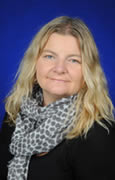 Dr Tracy Bowell
Dr Tracy Bowell
University of Waikato
On Engaging with Others: A Wittgensteinian Approach to (some) Problems with Deeply Held Beliefs
ABSTRACT:
My starting point for this talk is a problem in Critical Thinking pedagogy – the difficult of bringing students to a point where they are able, and motivated, critically to evaluate their own deeply held beliefs. I first interrogate the very idea of a deeply held belief, drawing upon Wittgenstein’s idea of a framework belief - a belief that forms part of a ‘scaffolding’ for our thoughts - or of a belief that functions as a hinge around which other beliefs pivot. I then examine the role of deeply held beliefs, thus conceived, in our ways of being in the world, exploring the extent to which engagement with others whose deeply held beliefs differ from ours may be possible through imaginative ‘travel’. Finally, I reflect upon the extent to which these imaginative moments also offer up opportunities for critical reflection upon our own deeply held beliefs and, thus, the possibility of changing or adapting those beliefs.
BIO:
Tracy Bowell is Senior Lecturer in Philosophy at the University of Waikato. She holds a BA (Hons) from the University of Sussex, an MPhil in Philosophy from the University of Cambridge, and a PhD from the University of Auckland. Her current research focusses in the areas of Critical Thinking, Epistemology, Wittgenstein’s Philosophy and Feminist Philosophy.
 Dr Catherine Legg
Dr Catherine Legg
University of Waikato
Charles Peirce’s Limit Concept of Truth
ABSTRACT:
This talk will present and explore Charles Peirce’s account of truth as “the opinion which is fated to be agreed to by all who investigate”. This account is arguably more objectivist than accounts of truth in terms of ‘usefulness’ found in other pragmatists such as William James and Richard Rorty. The account will be defended from three objections: i) Because it talks about a potentially infinite process of inquiry, it is incoherent. ii) Because it relies on a faith that inquirers will converge on one opinion if they inquire long and hard enough, it is too realist. iii) Because it defines truth as a kind of opinion, it is not realist enough.
BIO:
Catherine Legg holds a BA (hons) from University of Melbourne, an MA in Philosophy from Monash University and a PhD from Australian National University, where her thesis (“Modes of Being”) concerned Charles Peirce’s analysis of reality into ‘threes’, by contrast to the binary oppositions that have structured much Western philosophy. Her current research bridges philosophy of language, logic, ontology and Artificial intelligence, with a side interest in ‘cat metaphysics’. She has a longstanding interest in the educational framework known as ‘Philosophy for Children’, which arises from her research interests in American pragmatism.
The Marshall Lecture
This is the inaugural Marshall Lecture to be presented at our annual conference which PESA have named in honour of Prof. James D. Marshall, a PESA Honorary Fellow, past president and longstanding member who worked and published extensively in Philosophy of Education.
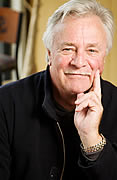 Prof Michael A. Peters
Prof Michael A. Peters
University of Waikato
Postcolonialism, Biopolitics and the Empire of Capital: Lines of Foucauldian Inquiry in Educational Studies
ABSTRACT:
Foucault died in 1984 and even before the body was cold, so to speak, scholars were already talking up the prospect of post-Foucauldian or post-critical studies. He was most assuredly a “figure of discursivity”, a phrase he used in regard to Nietzsche, Freud and Marx that signals a thinker of the first importance who had established a discourse or field based on a set of original concepts that generated new thought or new lines of investigation and provided the tools to pursue it. This paper provides a reading of the trope “after Foucault” to indicate three lines of inquiry in Foucauldian educational studies: the postcolonial, following Edward Said; the biopolitical, following Giorgio Agamben; and the Empire of capital, following Michael Hardt and Antonio Negri. This is a synoptic paper that engages with the question of how to read Foucault after thirty years of theorising, following the advice of Foucault himself, and in each case of the postcolonial, the biopolitical and the Empire of capital there are hermeneutical gains and losses. There is always a geopolitics of reading and the reception of texts in both spatial and temporal senses - in translation, in intergenerational readings, and in the boundary crossings of genre, discipline, gender and culture. In each case the field of educational studies opens itself to new problems, new priorities and new orientations that need constant scrutiny and appraisal for what is potentially useful, pragmatic, and politically astute or fragile, mundane and intellectually bereft.
BIO:
Michael is currently Professor of Education at University of Waikato. He held a Personal Chair at University of Auckland, was Professor at University of Glasgow and University of Illinois at Urbana-Champaign (now Emeritus Professor). Michael is an international scholar with interests in education, philosophy and social policy, who has published over 70 books and is Editor-in Chief of Educational Philosophy and Theory, editor of Policy Futures in Education; E-Learning and Digital Media; Knowledge Cultures, and Open Review of Educational Research.
Michael has co-authored three books on Foucault with Tina Besley. He is a life member of a number of learned societies, an Honorary member of the Royal Society of NZ, and recently received an honorary Doctorate of Letters from the State University of New York for his work on openness and social justice in higher education.
After Dinner Speaker - Sunday 23 November
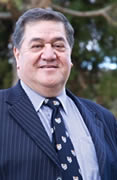 Distinguished Professor Graham Hingangaroa Smith
Distinguished Professor Graham Hingangaroa Smith
Chief Executive Officer/ Vice-Chancellor; Te Whare Wānanga o Awanuiārangi Companion of the New Zealand Order of Merit (CNZM); Fellow of the American Educational Research Association (AERA)
Iwi: Patrilineage: Ngāti Porou, Kai Tahu; Matrilineage: Ngāti Apa, Ngāti Kahungunu
BIO:
Distinguished Professor Graham Smith is an internationally renowned Māori educationalist who has been at the forefront of the alternative Māori education initiatives contributing significantly to the political, social, economic and cultural advancement of Māori communities. He has also worked extensively with other indigenous/ First Nations peoples across the world, including Canada, Hawaii, US mainland, Taiwan, Chile, Australia and the Pacific nations, contributing to national forums on indigenous issues.
His academic background is within the disciplines of education, social anthropology and cultural and policy studies, with recent academic work centred on developing theoretically informed transformative strategies for intervening in Māori cultural, political, social, educational and economic crises. He is involved in the development of Tribal Universities and formerly as Pro Vice-Chancellor (Māori), he was responsible for developing a Māori University structure within the University of Auckland.
With MA (Hons) dissertation ‘Māori Rituals of Encounter’, Graham was the first teacher of a Māori immersion Kura Kaupapa Māori school (Māori philosophy and principle-based School). His theoretical leadership has informed the emergence of Māori Education Studies as a distinct entity within the Tertiary Sector, in particular New Zealand Universities. This work has developed a wide-ranging academic discussion developed from his PhD, Kaupapa Māori Theory, Critical Theory and Transformative Praxis. Graham has been an active contributor to the critical debate on ‘race’ and ‘ethnicity’ both in New Zealand and abroad and maintains a strong influence in the Māori language revitalisation movement. His other specialist interest is in institutional transformations in order to deliver more effectively to, and for the interests of, indigenous students, faculty and communities. He has published widely and is in demand as a commentator on national and international indigenous matters. Graham will be an inspiring and challenging after-dinner speaker.
Publication Options
This page is to clarify how we will be dealing with the Conference Proceedings and to alert you to publications options after the conference.
We are aware that if Conference Proceedings have an ISBN they are regarded as a formal publication - then usually you can not publish the same paper in other journals. So to avoid this problem, the general Conference Proceedings do NOT have ISBN and will appear on the conference website.
There are several publication options that you need to consider.
A. Conference Proceedings – (no ISBN)
These will be in 3 sections on the Conference Website:
- Abstracts section for all the abstracts for presentations, symposiums & papers.
- Conference Papers section - be available for viewing and downloading. We will not print these at the conference so bring your own copies to distribute if you wish.
- Presentation (of work in progress, non-refeered) - a brief summary of presentations (2000 words max.) may sent to the Conference Administrator by October 24. PowerPoint presentations will not be uploaded but can be provided as a link.
B. PESA Conference 2014 Papers – ISBN number
You may choose to be included in PESA Conference 2014 Papers.
This will be assigned an ISBN number and so constitutes a publication.
Generally this means that without extensive changes it cannot be published in other journals, although with permission and acknowledgement it could be included in a book.
You may revise your conference paper but must submit it to the Conference Administrator by January 31.
C. Journals
- Educational Philosophy and Theory (EPAT). Michael Peters, Tina Besley & Jayne White will select and edit papers and presentations which have been developed into papers for a Special Issue of EPAT. These papers will be subject to the standard EPAT journal blind review process. If your paper is not selected for this Special issue it can still be submitted to EPAT or to other journals in the usual way where it go through the usual review process.
- Other journals. By all means send your papers to other journals as you see fit.
Venue & Hamilton
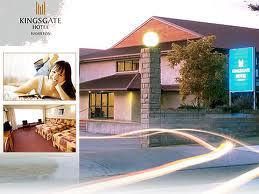
The conference will take place at The Conference Centre, Kingsgate Hotel, Hamilton, New Zealand. The hotel is located at 100 Garnett Road, Te Rapa – approximately 5 minutes from the city centre and conveniently located to reach any out-of-town place of interest. Plenty of free parking is available.
Wifi will be available.
Conference Centre Entrance & Parking
Drive past the reception area and turn to the left where there is a large parking area and the Entrance to the Conference Centre.
Accommodation Booking at Kingsgate
All Conference delegates are advised to register with their accommodation requirements using the online conference registration form and Jade Thorby from Orbit will confirm this on each delegate's behalf, or to email Jade at
For those who wish to stay in a separate location, many hotels and motels lie within a relatively short distance – approx. 20-30 min walk from the Kingsgate.
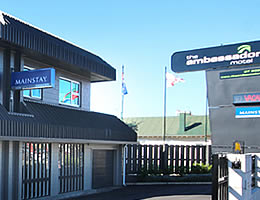 Another hotel option a short distance away that offers rooms and suites to suit different budgets is the Ambassador Hotel, http://theambassador.co.nz
Another hotel option a short distance away that offers rooms and suites to suit different budgets is the Ambassador Hotel, http://theambassador.co.nz
Find the best option for you check out these booking sites: AA traveller website or Wotif.
Further activities and transport and parking details in Hamilton can be found on the Hamilton City Council website.
Transport
For assistance with all your travel and visa arrangements, use the options available with Orbit Travel when you register.
Transport to and from Hamilton Airport
It is approximately a 20 minute journey from Hamilton Airport to the central city. Please refer to Hamilton Airport website for information regarding:
- directions to and from Hamilton Airport and city
- taxi and shuttle services
http://www.hamiltonairport.co.nz/page/hamair_10.php
Transport to Hamilton from Auckland Airport
Flights
A short connecting flight from Auckland to Hamilton may suit overseas visitors, but with connection times it may be preferable to select a minibus shuttle (see below).
Check Air New Zealand website for times and prices.
Hamilton International Airport has domestic airline connections with some New Zealand cities and a few Australian destinations.
Rental cars
These options are available both in the airport concourse and via complimentary shuttle to rental car operators a short distance outside the airport itself.
You could hire a car for the duration of your trip – get great rates here http://www.vroomvroomvroom.co.nz/
Minibus Shuttle
A minibus shuttle from Auckland International Airport to Hamilton must be pre-booked and costs approximately are $65 one way. Book at http://www.minibus.co.nz/
Intercity Bus
You can get an intercity coach from the International Terminal at Auckland https://reservations.coachbookings.co.nz
Dining Out
Hamilton has a restaurant to suit any mood and taste. Please click on the following links to explore the selection of cuisine in the Hamilton area.
Travel Around the Waikato and Bay of Plenty
Orbit Travel can arrange activities for you or check out the i-SITE visitor Centres
i-SITE is New Zealand’s official visitor information network providing visitors with travel information, tools and advice as well providing a booking services throughout New Zealand. http://www.hamiltonwaikato.com/general/i-site-visitor-centres
Here is the Hamilton i-SITE: www.hamiltonwaikato.com
Local Activities
For swimmers or if you have family with you, Hamilton has an excellent Waterworld swim complex in the street behind the hotel which includes our favourite, the Hydrotherapy pool:
http://www.hamiltonpools.co.nz/index.php
Some of you will be keen runners so check the Conference notice board if you'd like to get together with some of our members - including Peter Roberts, Leon Benade, John Quay, Lynley Tulloch, Liz Jackson, Sonja Arndt and others (rumours are for an early morning 5k run....maybe a new competition -- the Philosophers's race - not to be confused with Monty Python?)
For lovely walks & cycleways, we are fairly close to the Waikato River walkway/ cycleway. Several websites can assist you to find city routes and others beyond the city.
- http://www.hamilton.govt.nz/our-city/parks/cyclewayswalkways/Pages/default.aspx
- http://www.visithamilton.co.nz/page/pageid/2145873756/Walkways_and_Cycleways
- http://www.waikatorivertrails.com/
Other Useful websites about Hamilton
45 mins from Hamilton is Matamata, the home of Hobbiton, Lord of the Rings & The Hobbit movie set tours. To arrange a visit, book at i-SITE Matamata or http://www.hobbitontours.com.
Not too far are beaches is Raglan to the West (45 min drive) & some great cafes.
To the East, about 20 minute drive is Cambridge, world famous horse racing stables and high performance sports (cycling & rowing at Lake Karapriro). Approx. an hour away is Tauranga and the beautiful east coast beaches of Mt Maunganui, and The Bay of Plenty. Whakatane sits in the spectacular Eastern Bay of Plenty, and is the location of Te Whare Wananga o Awanuiarangi.
The Coromandel Peninsula is the east. On the way stop at Te Aroha famous for its mineral pools (personally recommended!).
South are the beautiful Waitomo caves and black water rafting.
Rotorua is approx. 1.5 hrs south.
Emergencies
In New Zealand the emergency phone number for police, ambulance, fire brigade is 111 from any phone.
If you you have a minor injury or feel unwell and require non-emergency medical treatment, contact the Kingsgate Hotel reception or ring Healthline 0800 611 116 anytime, day or night for health advice.
Hamilton has several Accident & Emergency Clinics:
Anglesea Accident & Emergency
Anglesea Street (next to ASB Bank), Gate 1 (View on map)
Phone +64 7 858 0800
http://www.angleseamedical.co.nz/
Victoria Central Accident and Medical Centre
750 Victoria Street
Hamilton 3204
Phone: +64 (7) 834 0333
http://www.victoriacentral.co.nz
Waikato Hospital
Emergency Dept
Gate 2, Pembroke Street, Hamilton
Ring 111 and ask for an ambulance or go immediately to the nearest emergency department. If you are seriously worried, don’t hesitate to attend an emergency department or call an ambulance. You will receive treatment in priority order (the seriousness of your condition), not the order you arrive in.
http://www.waikatodhb.health.nz/for-patients-and-visitors/in-an-emergency/
